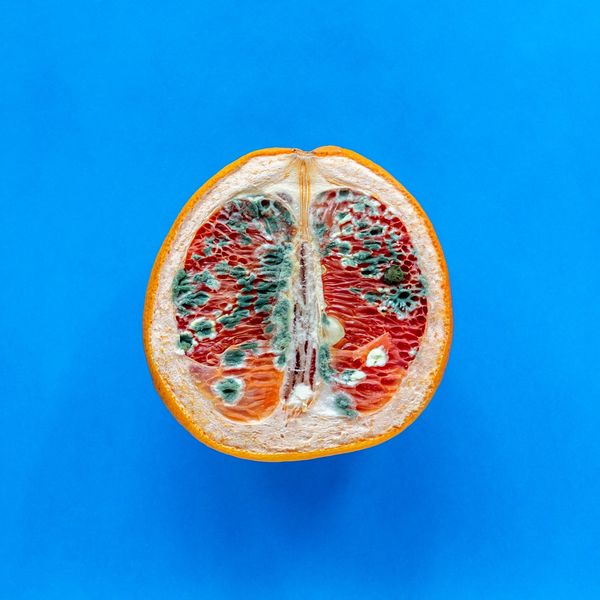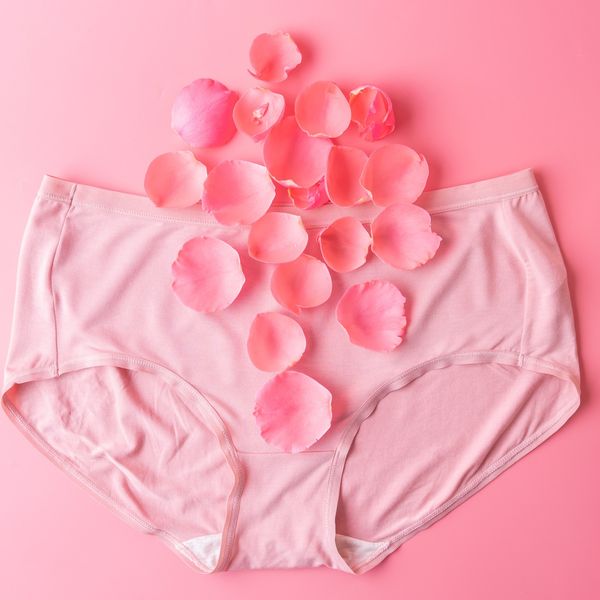
Over the course of time, I’ve written articles for xoNecole on how to incorporate foods that will improve the health of your vagina (“The Foods Your Vagina's Been Craving”) as well as ones that will ultimately do your vagina more harm than good (“Here’s What Your Vagina Wishes You Would Eat LESS Of”). And while, in a perfect world, our daily diet would consist of all of the nutrients that our va-jay-jay needs, the reality is that most of us need to add a few supplements — ones that will keep “her” happy and thriving.
That’s what we’re gonna tackle over the next few minutes — different supplements that you probably knew were good for other parts of your body yet can also do wonders for your vagina (and vaginal-related activities) too.
1. Vitamin A
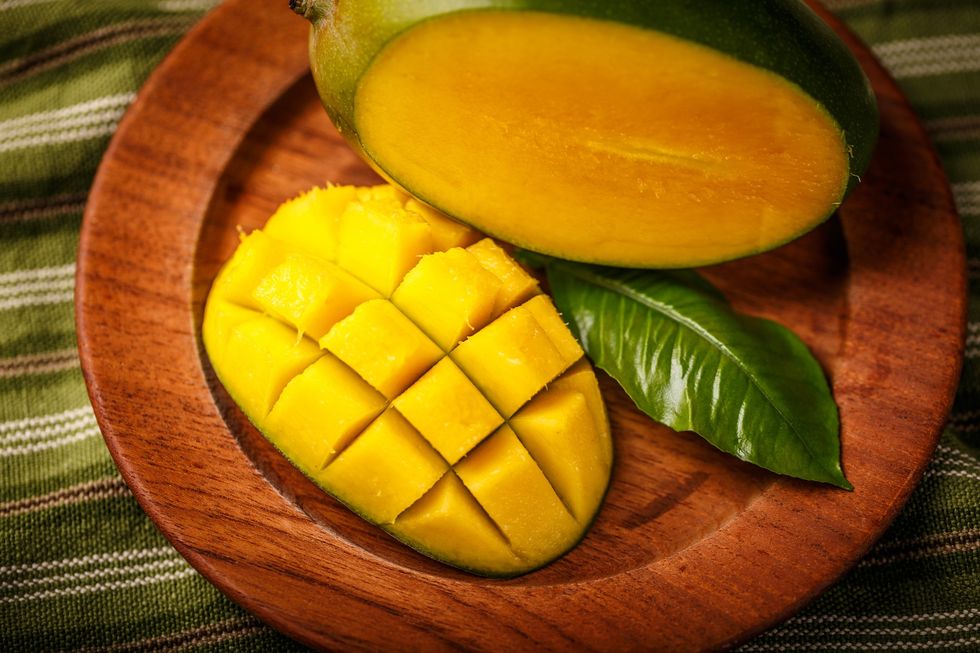
Getty Images
If you want to have a strong immune system, the ability to get pregnant easier/faster, great vision, and the assurance that your organs are receiving what they need in order to function properly, you definitely need to get some vitamin A into your system on a regular basis. Some foods that are rich in this particular nutrient include tomatoes, mangos, eggs, carrots, butter, and salmon.
As far as your vaginal health goes, vitamin A is essential because it helps with the development of your mucous membranes. This is relevant when it comes to your vagina because not only do they play a role in keeping your vagina moist, but they also make it easier for that part of your body to fight off infection as well.
2. Vitamin C
There’s a reason why health experts advise that you up your intake of vitamin C during cold and flu season. Not only is it a super potent antioxidant that’s incomparable when it comes to fighting off free radicals, but this vitamin also helps to keep your blood pressure in check, reduce your risk of heart disease, and helps your body to absorb iron. Vitamin C is also dope on the natural beauty tip since it helps your body to produce collagen (which is what helps your skin and hair to maintain elasticity). Foods that are high in vitamin C include citrus fruits, berries, potatoes, bell peppers, and broccoli.
Your vagina could benefit from vitamin C if you’re looking to treat a bout of bacterial vaginosis (BV) or if you want an all-natural way to decrease vaginal odor (although if the odor persists, you should definitely make an appointment to see your doctor).
3. Vitamin D
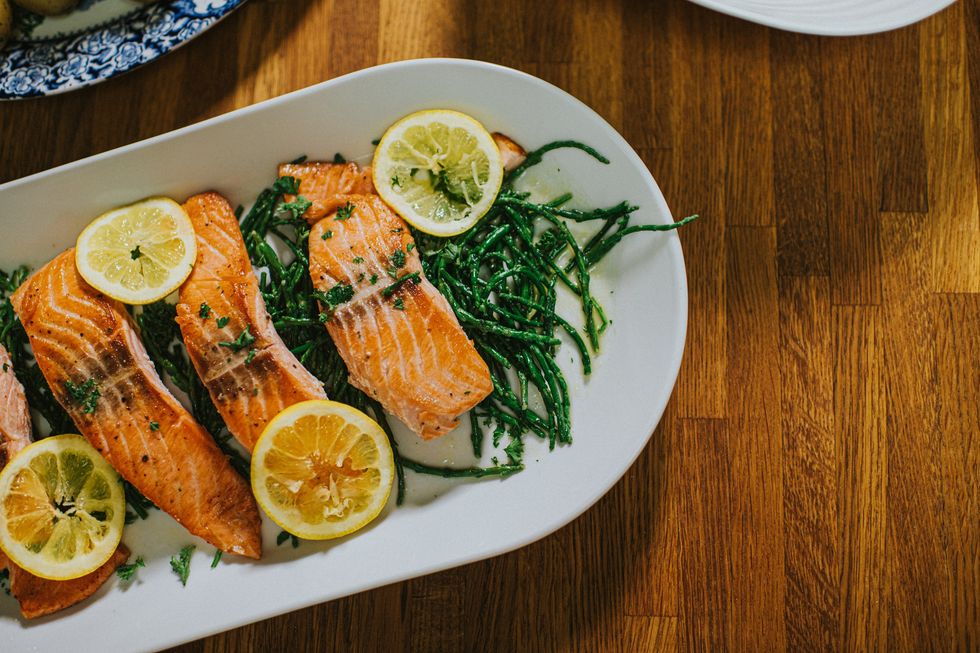
Getty Images
You probably already know that vitamin D is good for your teeth and bones. Did you also know that it’s essential when it comes to fighting bodily inflammation or that it helps to treat depression and can help you to lose weight? Foods that are a great source of vitamin D include dairy, salmon, fortified orange juice, fortified cereal, and mushrooms.
The reason why Vitamin D makes the “pro vaginal health” list is that it helps to prevent vaginal dryness in menopausal women. Studies also reveal that people who are deficient in this nutrient tend to have a lower sex drive and a more challenging time experiencing orgasms. Salmon tonight, anyone?
4. Vitamin E
From your brain to your blood to your reproductive organs, vitamin E is something that your body needs from head to toe. Personally, I’m all about it because I like what the nutrient does for my skin. That’s because it’s great at reducing the appearance of scars, softening the skin, and keeping it from premature aging (it’s also got properties that reduce the itching that comes with eczema and psoriasis). Foods that are good sources of vitamin E include almonds, peanuts, collard greens, pumpkin, and spinach.
Also, if you’re feeling a little dry down below, applying some pure Vitamin E oil can bring some immediate relief. Just make sure that you don’t rely on it for vaginal lubrication if you plan on using a latex condom. Latex and oil do not mix — even when it’s something as awesome as this particular oil-based vitamin.
5. Aloe Vera Juice (or Tablets or Gel)
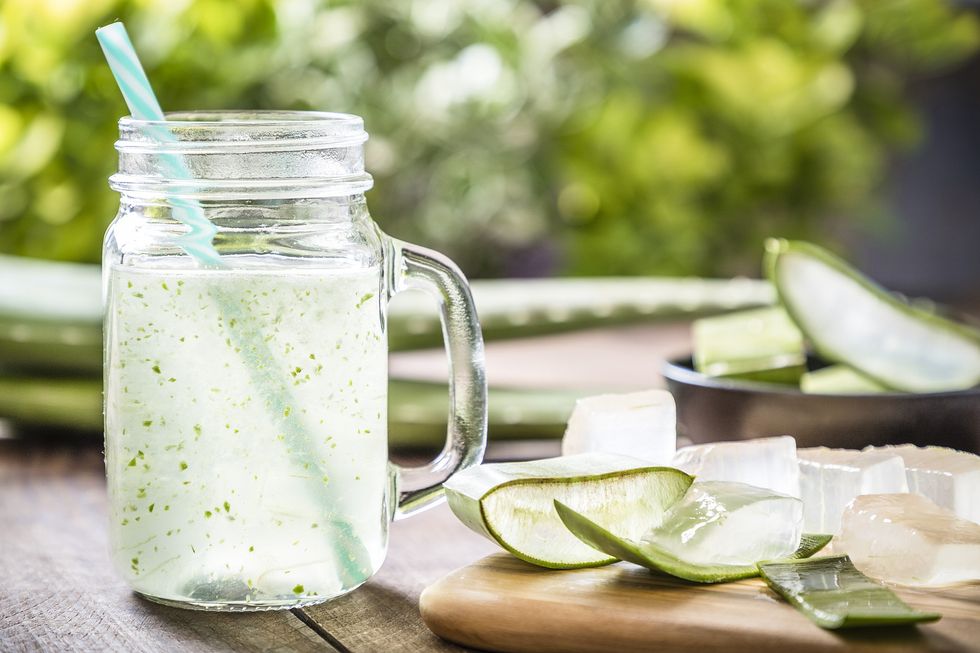
Getty Images
Even though it’s definitely something that you’ll want to put into your juice or a smoothie (because it’s kind of…blah without some assistance), you can’t go wrong with adding some aloe vera juice to your diet. For starters, it’s quite the mega-nutrient when you stop to consider the fact that it includes vitamins B12, C, and E, folic acid, a ton of different enzymes, and magnesium and zinc (and that’s just scratching the surface!). That’s why it’s not surprising that aloe vera juice is good for regulating blood sugar levels, healing inflamed gums and ulcers, and treating constipation. Beauty-wise, it hydrates dry skin and soothes the effects of eczema and psoriasis.
And what can it do for your vagina? Well, consuming it in juice form can help to keep your vagina naturally lubricated from the inside out. If you apply it as a gel, it’s got a pH balance that complements your vagina, and its anti-inflammatory, antimicrobial, antifungal, and antiseptic properties can make it a great vulva soother after a night of a lot of friction or even as a lubricant if you’d prefer to go a chemical-free route.
6. DHEA
The reason why DHEA is actually called that is that its real name is dehydroepiandrosterone (right…try spelling that after looking at it only one time). Long story (and name) short, it’s a natural hormone that helps to produce other hormones like testosterone and estrogen. Because DHEA is somewhat of a hormone balancer, some people take it in supplement form to treat things like depression, erectile dysfunction, and even obesity. It’s also effective as it relates to slowing down the signs of aging. Plus, some studies show that people with type 2 diabetes have a lower level of DHEA in their system than they actually should (good to know if that’s a health issue for you).
Vaginally, DHEA is helpful at balancing estrogen levels inside of your vagina, which can help to make sexual intercourse more pleasurable. Just make sure to run this one by your doctor first because too much estrogen in your system can sometimes produce unwanted side effects.
7. Sea Buckthorn Oil
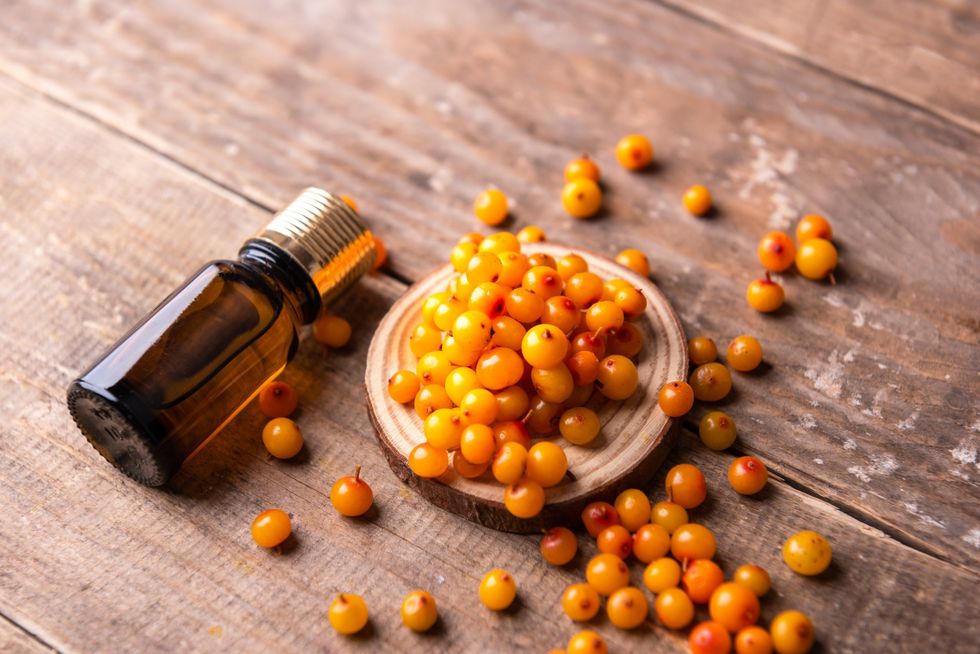
Getty Images
Although it’s certainly not the kind of nutrient that comes up in daily conversation, never sleep on sea buckthorn oil. The backstory is it's an oil that comes from a Himalayan plant called — yep, you guessed it — the sea buckthorn, and it does all kinds of awesome things for your health. Not only is it a solid source of Vitamin E, calcium, zinc, and copper, but it’s also an oil that helps to reduce your blood sugar levels, keep your skin moisturized, support your liver health, strengthen your tresses, and even make menopause easier to deal with.
And why will your vagina adore it? If you want a source of fatty acids that will help to keep your vaginal walls lubricated, this oil can help to accomplish that goal. Also, if you’re post-menopausal and you don’t want to do traditional estrogen hormone therapy, sea buckthorn oil has studies to support that it’s an awesome alternative when it comes to treating vaginal atrophy (the thinning and dryness of your vagina that oftentimes comes with menopause).
8. Hyaluronic Acid
Probably what hyaluronic acid has the best reputation for is beauty. That’s because it’s awesome when it comes to softening the appearance of fine lines and reducing the appearance of scars on your skin. However, don’t overlook the fact that it contains properties that keep your joints working well as well as keep your eyes hydrated (because experiencing dry eyes is the absolute worst).
When it comes to vaginal atrophy, this is another all-natural treatment that leads the pack. Applying it topically can also help with vaginal dryness or discomfort from sexual penetration, especially if you’re currently dealing with cancer treatments.
9. Fatty Acids
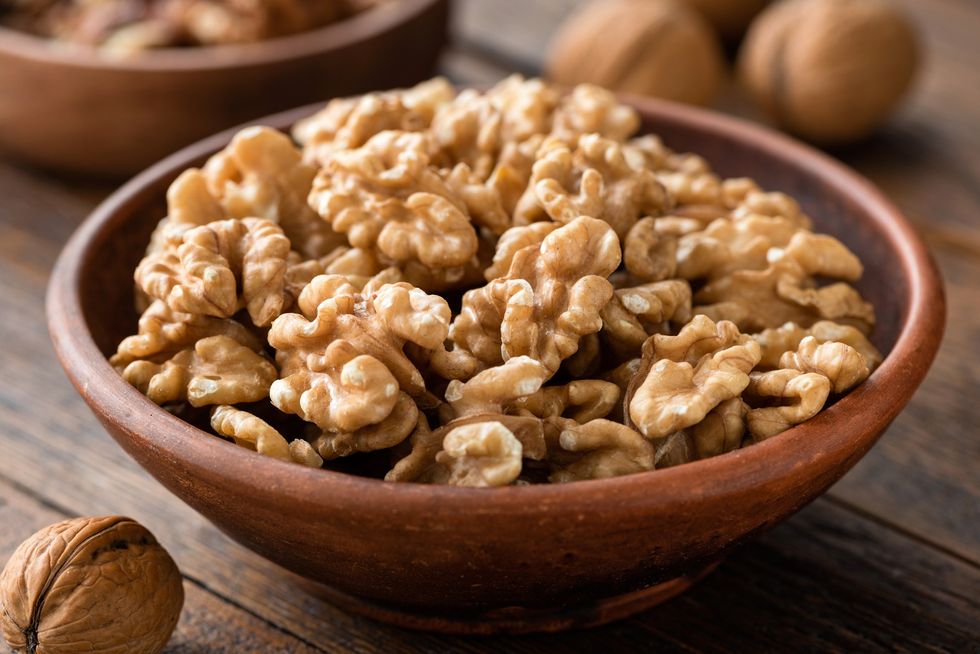
Getty Images
If you’ve always wondered what a “fatty acid” technically is, the best way to describe it is, it’s a building block of fat — one that actually works in your favor. Take omega-3 fatty acids, for example. The properties in it are able to reduce anxiety, improve your vision, naturally assist with the treatment of ADHD (in children), bipolar disorder, and autoimmune diseases and make period-related discomfort more bearable. By the way, foods that are high in this particular fatty acid include tuna, walnuts, and canola oil.
Vaginally, you can benefit from fatty acids because they help to treat vaginal infections (like BV), vaginal dryness (especially in breast cancer patients) and increase pleasure-related chemicals like dopamine and serotonin, so that you’re able to have a more sexually-fulfilling experience. Very cool, indeed.
10. Cranberry Pills
Something that’s definitely packed with antioxidants is cranberries. Its high acidic content makes it pretty reliable when it comes to healing oral health issues, reducing the risk of heart disease, and providing a holistic approach to treating urinary tract infections (UTIs). If you’re also looking for a way to maintain your digestive health as you reduce bodily inflammation, cranberries have your back in those departments too.
Since cranberries are so good at keeping UTIs at bay, this means that they help to reduce the build-up of bad bacteria in your vagina, which is always a good thing. So, if you hate the bitter taste of cranberries, remember that you can always take them in pill form — unless you’re allergic to aspirin; some studies say you could experience side effects if that happens to be the case.
11. Black Seed Oil
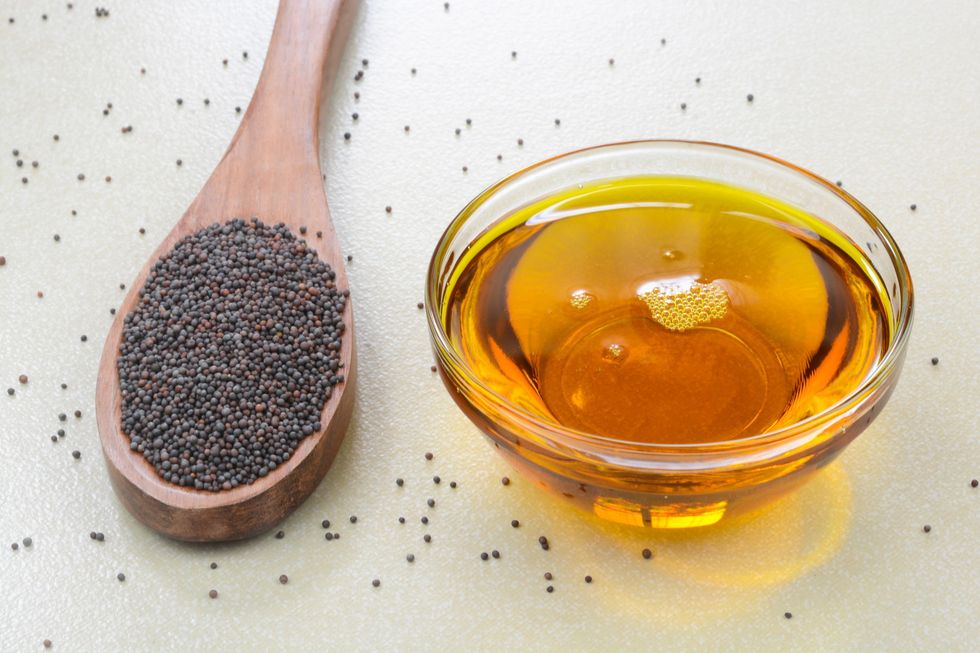
Getty Images
Something that I’m a super fan of is black seed oil. It comes from the Nigella sativa plant, and another name for it is black cumin. Actually, who put me on to it is actor (and choreographer) Darrin Dewitt Henson. I can’t seem to find the clip on YouTube, but years ago, he was on The Breakfast Club saying that he attributed his ageless appearance to black seed oil. I looked it up, and an article on its whopping 101 benefits had me hooked. If you’re looking for an all-natural way to lower your blood pressure, heal breakouts, boost your immunity, and even treat asthma, look no further (although I adore it for what it’s done for my skin!).
As far as your vagina goes, if you’re like me and you have a natural fungal sensitivity, this is an oil that can help to keep candida in its proper place. It can also help to clear up vaginal discharge that may irritate your vulva.
12. Probiotics
Probably the easiest way to describe probiotics is they are live microorganisms that help to keep your gut healthy — and since 80 percent of your immunity is in your gut, taking care of that part of your body is always a vital thing to do. Probiotics help to keep bad bacteria from overtaking your system, make it easier for you to digest your food properly, can make taking medication easier to do, will reduce cholesterol levels, and is great at treating acne, eczema, and hydrating dry skin.
Definitely get some for your vagina because probiotics keep bad bacteria from causing a yeast infection, help to treat BV, and can even help to prevent the growth of cervical cancer cells. And since probiotics can also assist with improving your moods, boosting your energy levels, and increasing your libido — the next time you’re at your local health store, be sure to pick some up. If you need a bit of assistance in making the right selection, check out Byrdie’s “10 Best Probiotics for Women of 2023 for Gut Health” and Healthline’s “10 of the Best Probiotics for Women in 2023 According to a Dietitian.” Your vagina will certainly thank you!
Let’s make things inbox official! Sign up for the xoNecole newsletter for daily love, wellness, career, and exclusive content delivered straight to your inbox.
Featured image by HUIZENG HU/Getty Images
This Is How To Keep 'Holiday Season Stress' From Infecting Your Relationship
Hmph. Maybe it’s just me, but it seems like there is something really weird happening in the fall season air (because winter doesn’t officially begin until December 21) that cuddle season is in full swing while break-up season is as well. In fact, did you know that break-ups are so popular during the holiday season that December 11 is deemed Break-Up Day?
The reasons why relationships shift around this time vary; however, I did both roll my eyes and chuckle when I read that a very popular one is because it’s an easy way to get out of getting one’s significant other a Christmas present. SMDH.
Anyway, I personally think that the less shallow folks out here may contemplate calling things “quits” or they at least distance themselves a bit from their partner (and what I’m referring to is serious relationships) due to all of the stress and strain that oftentimes comes with the holidays whether it be financial, familial, due to their tight schedules or something else.
Listen, I would hate for you and your man to miss the fun and happiness of experiencing this time of year, all because you are so overwhelmed or irritated that you can’t really enjoy it. That’s why I have a few practical tips for how to avoid allowing the typical holiday season stress from INFECTING your relationship.
Manage Your Expectations
 Giphy
GiphyUnmanaged expectations. If there is a main reason why the holiday season tends to be so stress-filled for so many people, I’d bet good money that this is the cause. And when you’re in a long-term relationship, expectations can manifest themselves in all sorts of cryptic and/or unexpected ways. You might have relatives who assume that you are going to be with them for Thanksgiving or Christmas when you have other plans in mind. You might be thinking that you are going to spend one amount for presents while your man is thinking something totally different. When it comes to scheduling, your signals may be crossed.
And you know what? To all of these scenarios, this is where clear and consistent communication come in. Don’t assume anything. Don’t dictate anything either. From now until New Year’s, mutually decide to check in once a week, just to make sure that you are both on the same page as it relates to the holidays and what you both are thinking will come along with it. The less blindsided you both feel, the less stressed out you will be. Trust me on this.
Set (and Keep) a Budget
 Giphy
GiphyOkay, so I read that last year, 36 percent of Americans incurred some type of holiday-related debt. Hmph. Last year, there was still some sense of normalcy in this country, chile, so I can only imagine what finances are gonna look like over the next several weeks. That said, since I don’t know a lot of people who don’t find being broke stressful, make sure that you and your bae set a budget and then stick to it this year — no ifs, ands or buts.
Because really, y’all — it doesn’t make sense to deplete savings and/or max out credit cards for a few days of giggles only to be damn near losing your mind because you don’t know how to make ends meet come Dr. Martin Luther King, Jr. Day.
And by the way, this tip doesn’t just speak to things like food and gifts; I also mean travel. If it doesn’t make a ton of sense (or cents) to be all over the place this year — DON’T BE.
Keep Matthew 5:37 at the Forefront
 Giphy
GiphyIf off the top of your head, you don’t know what Matthew 5:37 says, no worries, here ya go: “But let your ‘Yes’ be ‘Yes,’ and your ‘No,’ ‘No.’ For whatever is more than these is from the evil one.” That verse right there? Oh, it’s a boundaries lifesaver! I say that because do you see “maybe” or “I’ll think about it” in there? Nope. LOL. It says that you should tell people “yes” or “no” and leave it at that — and that complements Anne Lamott’s quote, “’No’ is a complete sentence” impeccably well. Yeah, you’ve got to remember that anything beyond a yes or no to a request is privileged information; you don’t owe anyone details or an explanation.
Besides, if you are really honest with yourself, when someone asks you something and you give a “Umm, let me think about it” kind of reply, more times than not, you already know what your answer is going to be — so why not let you both off of the hook? Give your response. Commit to that. And let everyone (including yourself) get on with their lives and schedules.
I promise you that when it comes to those holiday parties, you are pissing more folks off by not RSVP’ing or doing so and not showing up than just saying, “Thank you but not this year” off the rip.
Remember That Your Personal Space Is Privilege Not a Right
 Giphy
GiphyA friend of mine recently bought a new house and invited me over to come see it. He’s a single man with no children, so as I was taking in all of the space that he had, especially as I walked through his finished basement, I joked about relatives coming to live with him. “Hell no” and “absolutely not” were pretty much his immediate responses as he went on to say that some folks even had the nerve to be offended when he told them that he had no intentions on taking DNA in.
Ain’t it wild how people think that your stuff is their right? And yes, that brings me to my next point. Your home is your sanctuary space. If you want to host folks this year — cool. If not, ALSO COOL. Please don’t let folks (family included) guilt you into how they want you to act or even into what they would do if the shoe was on the other foot. You are not them — and as one of my favorite quotes states, “If two people were exactly alike, one of them would be unnecessary.” (A man by the name Larry Dixon said that.)
Hell, my friends? They know that I am good for sending them random things that they need or even want all throughout the year. Coming over to hang out at my pace, though. Uh-uh. Chalk it up to being a card-carrying member of the ambivert club yet I like keeping my living space personal — and I sleep like a baby, each and every night, for feeling that way.
Always remember that your space, your time, your resources, your energy and shoot, yourself period (including your relationship), are all things that are your own. You get to choose how, when and why you want to share them. The holiday season is certainly no exception.
Cultivate Some “You Two Only” Traditions
 Giphy
GiphyIt’s not uncommon for some couples to hit me up after the holiday season to “detox.” Sometimes it’s due to the financial drama (and sometimes trauma) that they experienced. Sometimes it’s because they allowed their relatives (especially in-laws) to get more into their personal business than they should’ve. More than anything, though, it tends to be because they didn’t get enough quality time together and so ended up feeling “disconnected.”
Please don’t let that happen. Listen, I’m not even a holidays kind of woman and yet, I will absolutely sit myself down with some hot chocolate and chocolate chip cookies to enjoy a Hallmark holiday film or two. Aside from the fact that most of them are lighthearted and sweet, I also like that they usually focus on couples loving on each other amidst all of the holiday beauty and ambiance — which is something that all couples should set aside some time to do.
Maybe it’s a vacation. Maybe it’s a staycation. Or maybe it’s my personal favorite, A SEXCATION. Whether it’s for a few days, the weekend or even overnight — don’t you let the holidays go by without setting aside time for you and your man to celebrate one another. Don’t you dare (check out “Are You Ready To Have Some Very Merry 'Christmas Sex'?”).
GET. SOME. REST.
 Giphy
GiphyI once read that 8 out of 10 people get stressed out over the holidays and 3 out of 10 lose sleep during to it — and when you’re stress-filled and sleep-deprived, that can absolutely lead to hypersensitivity, making mountains out of molehills and even not being in the mood for sex.
Your relationship can’t afford to go through any of this, so definitely make sure to prioritize rest. I don’t care how unrealistic it might seem during this time, sleep should never be seen as a luxury; it will always and forever be a great necessity.
That said, try to get no less than six hours of shut-eye in (check out “6 Fascinating Ways Sex And Sleep Definitely Go Hand In Hand”) and even ask your bae to take a nap with you sometimes (check out “Wanna Have Some Next-Level Sex? Take A Nap, Sis.”). Not only will sleep help to restore your mind, body and spirit but, when it’s with your partner, it’s an act of intimacy that can make you both feel super connected, even in the midst of what might feel like chaos.
___
Holiday season stress is real. Still, never give it the permission or power to throw your relationship off. Put you and your man first and let the holidays be what they are gonna be, chile.
Let’s make things inbox official! Sign up for the xoNecole newsletter for love, wellness, career, and exclusive content delivered straight to your inbox.
Featured image by Shutterstock
Whew. Did you know that somewhere around 122 million Americans travel during the holiday season? Listen, I went to see my godbabies this past September and got caught up in a crazy ass traffic jam at BNA (the Nashville airport) that damn near has me considering air travel ever again — especially during this time of the year.
Besides, it’s not like it’s a written rule that you have to travel over the holidays. In fact, if you want to play it chill this year, why not enjoy a staycation instead? Although it might seem like it’s a “poor man’s compromise,” as you’re about to see, it actually…isn’t.
1. Go All Out with the Christmas Décor
 Giphy
GiphyThere is someone I know who is so obsessed with Christmas, she’s damn near annoying-borderline-terrifying. I’m. Not. Kidding. Yet hey, if you’re going to do a holiday-themed staycation (emphasis on “holiday-themed”), that’s kind of how you’ve got to be. Some décor ideas include:
- A fresh Christmas tree (is the most ideal) that is ultimately decorated
- Wreaths on outside and inside doors
- Garland (with twinkle lights) in predictable and unpredictable places
- Poinsettias
- Mistletoes
- Snow globes
- A stocking (with some of your favorite things in it)
- Fake snow
- Stars
- Angels
- Candy canes
- A BLACK Santa (LOL)
I mean, since you are going to be spending a lot of time at home, it can feel like a mini-winter wonderland if you are intentional about doing more decorating to your living space than you ever have before!
2. Buy a Couple of Christmas-Themed PJs
 Giphy
GiphyWhile I was doing some research on a totally different topic, I happened upon an article that talked about the psychology behind why we should be intentional about what we wear to bed. When you stop to think about the fact that (hopefully) you are sleeping somewhere between 6-8 hours every night, it would make sense that things like the color and fabric of your sleepwear would have a real impact on you — even subconsciously.
Well, when it comes to Christmas décor, specifically, not only does it take you back to nostalgic memories, it can also boost your moods. So, aside from being on-10 with your Christmas décor, also invest in some Christmas-themed PJs. Since you’re going to be doing a lot of lounging around (RIGHT?), do it in something that makes you think about all of your favorite things about this time of year.
3. Cop Some Christmas-Scented Candles
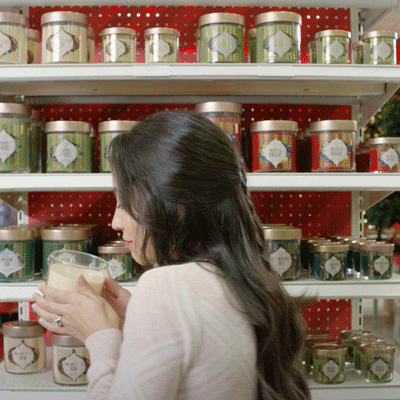 Giphy
GiphyThere really is no telling how many articles that I’ve written where I am singing the praises of scented soy candles. Candles are soothing, comforting and a very easy way to reduce stress. Also, since it gets darker quicker and for a longer period of time around this time of the year, candles provide a relaxing vibe to your home. Since it is Christmastime, go with scents that are reminiscent of the season:
- Cinnamon
- Vanilla
- Cranberry
- Apple
- Pine
- Frankincense and Myrrh
- Peppermint
- Cashmere
- Ginger(bread)
- Orange
- Sugar Cookies
- Sandalwood
- Cloves
- Cedarwood
- (Hot) Chocolate
Personally, one of my favorite candle companies is Goose Creek. Their signature collections will have your entire house smelling like a high-end bakery. No exaggeration.
4. Play Some Winter-Themed ASMR Sounds
 Giphy
GiphyI’m from Nebraska and my mother was a New Yorker. So, if there is one thing that I like, it’s seasons and that includes snow during wintertime. Unfortunately, Nashville is cray-cray when it comes to that. If, where you live, the weather is all over the place too (which is why I think it’s insane that some people still give pushback to global warming) and you would like for it to at least seem like you are in your own winter wonderland — invest in some fake snow to strategically place around your home.
Oh, and don’t forget to turn on some winter-themed ASMR sounds too. YouTube has videos that run for hours on end that feature blizzards and howling winds that really can make you feel like you are in the midst of an ice storm.
5. Host a Holiday Movie Marathon
 Giphy
GiphyOne thing to remember about a staycation is it doesn’t mean that you have to be alone or that the only people who can participate are the ones who live with you. Since a staycation is simply about staying close to home instead of traveling afar — absolutely consider having some of your favorite people over for a holiday-themed movie marathon. Shoot, Black America Web even did you a solid by publishing “25 Best Black Christmas Movies Of All Time;” plus, Tubi has a Black holiday hits section of indie films too.
Oh, and make sure to get creative with the Christmas-themed snacks. Some ideas? Some Kentucky-fried turkey tenders with cranberry hot sauce (recipe here), some Holiday Hot Spinach Dip (recipe here), some Grinch Kabobs (recipe here), some roasted pecans (recipe here) and some Pomegranate Guacamole (recipe here).
6. Spend a Night (or Two) at a Hotel or Vacation House
 Giphy
GiphyJust like you don’t have to be alone during a staycation, you also don’t have to be cooped up in your house the entire time. Get a change of scenery in your own city by spending the night in a hotel that you’ve always wanted to try out or renting a vacation house for you and some of your folks to hang out in during the time between Christmas and New Year’s Day. I have a “love little sister” who does this randomly when she needs a break from her work as a therapist. She says that it’s damn near like taking a trip (and she has PLENTY of passport stamps; trust me).
7. Have Brunch or Dinner at a Christmas-Themed Restaurant
 Giphy
GiphyIf nothing puts a bigger smile on your face than the thought of DoorDashing meals and barely even touching your stove during your staycation — hey, I am right there with you. Do consider going out to brunch or dinner during your chill time, though. It’s another way to bond with people and create some current holiday memories. And if you’ve got a bae and you opt for dinner, it can be a wonderful type of Christmas-themed date.
8. Go to a Holiday-Themed Concert
 Giphy
GiphyBeing that I got my start as an entertainment writer, hear me when I say that I’m not someone who just has to go to a live concert every chance that I get. Oh, but baby, when I saw that El DeBarge was doing a City Winery tour and he was going to be here right before Christmas — I booked myself a ticket quick, fast and in a super-duper hurry! Shoot, I didn’t even want to go with someone because I plan to give him and that falsetto voice of his my complete and undivided attention. LOL.
I don’t know what it is about the holiday season that makes live music that much more enjoyable — but if there is a concert that features one of your favorite artists happening right through here, consider that to be a cool way to “tour your city” while cultivating a really awesome memory at the same time.
9. Also, Go Ice Skating
 Giphy
GiphyOne of my fondest memories of time with my father is going ice skating. We actually would do it in the summer (because that is when I would visit him) and, every year, he would get me a new ice skating outfit. Even now, when I watch someone ice skate (even in movies; like in the classic movie Garden State), I will have warm fuzzies.
Anyway, if you’ve never been before, go. If it’s been forever since you have, also go. There is something that is very sweet and so signature Christmas about it. Plus, it’s a top-tier form of exercise.
10. Take a Christmas Lights Tour
 Giphy
GiphyAnother one of my favorite Christmas memories is driving through neighborhoods and looking at the Christmas lights. And just like a Christmas concert can be a form of hometown touring, so can doing this if you decide to choose a couple of areas where you’ve never really been or rarely frequent.
Now are you excited about the thought of experiencing a holiday-themed staycation?
I thought you would be. ENJOY!
Featured image by Shutterstock






